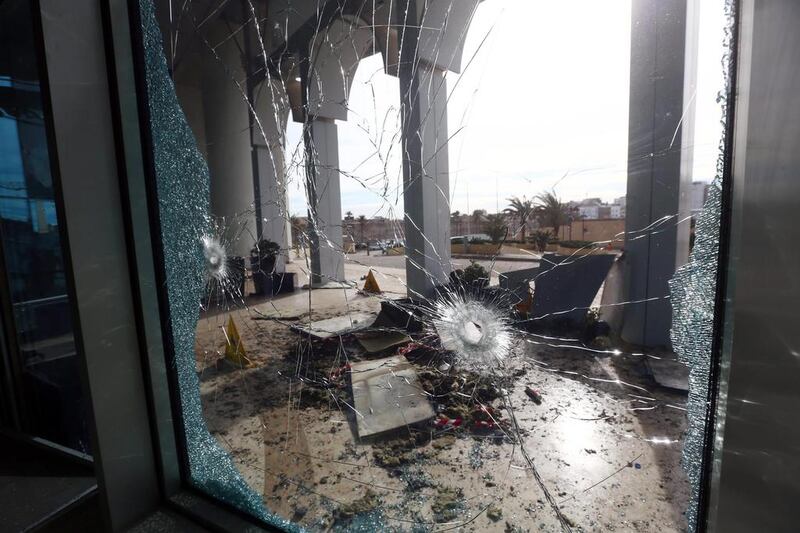GENEVA // Fresh details of the brutal attack by militants on Tripoli’s most luxurious hotel emerged on Wednesday as UN mediators continued talks with Libyan delegates at a peace conference in Geneva.
At least 10 people died when three gunmen fought their way into the Corinthian hotel on Tripoli’s waterfront after detonating a car bomb outside.
Among them was David Berry, 34, a former US marine working for the American security company Crucible, who tried to repel the militants, according to witnesses.
A group calling itself Islamic State for Tripoli Province claimed the attack, saying it was revenge for Anas Al Liby, who was arrested in Tripoli last year and died in US custody on January 2 just days before he was to go on trial for terrorism in New York.
Islamic State for Tripoli Province, which declares itself an affiliate of ISIL, also claims to operate in the eastern cities of Derna and Sirte, where it says it has kidnapped 20 Egyptian Copts.
The Corinthian, an elegant sand-coloured 24-storey structure, is popular with officials and diplomats. In October 2013, the former prime minister Ali Zeidan was briefly kidnapped by gunmen from the room where he had taken up residence.
Once inside the hotel on Tuesday morning, the gunmen sprayed the lobby with gunfire before moving upstairs, killing victims reported to include a French citizen and two Filipinos.
Libyan officials and other hotel guests managed to escape through the rear entrance.
Witnesses said Berry died in a gun battle on one of the upper floors, after which one of the gunmen was blown up, possibly by a suicide charge, and two others were shot dead after being cornered by security forces.
The ferocity of the attack in the heart of the capital underlines the chaos and violence now dominating a country that next month will mark four years since the start of its Nato-backed uprising against Muammar Qaddafi.
Libya is now divided between forces of the internationally recognised House of Representatives, based in the eastern city of Tobruk, and the reconvened General National Congress, which controls Tripoli.
The United Nations Security Council condemned the attack and reiterated its support for the efforts of UN special envoy Bernardino Leon as he continues peace talks in Geneva.
The talks are handicapped by the refusal of the GNC to attend, but UN officials say that in addition to the recognised government, numerous Libyan political actors and civil rights groups are attending. Mr Leon said he was encouraged by the GNC statement that it would attend the talks if they were moved to Libya, although the security situation there makes for a shortlist of possible venues.
Meanwhile, Mr Leon hopes to reach a broad consensus on the need for a ceasefire, with the heads of more than a dozen municipal councils arriving in the Swiss city on Wednesday to broaden discussions.
Officially, the UN’s special mission to Libya (UNSMIL) is optimistic, saying progress was being made. “Discussions were conducted in a positive atmosphere reflecting the sense of national responsibility and a sincere determination to find solutions to end the political and military conflict buffeting their country,” it said in a statement.
Attention is now focusing on invitations issued earlier this month to military and militia leaders to travel to Geneva, possibly on Friday, and whose agreement will be crucial to make any peace plan stick.
Two men in particular will need to sign up. On the side of the recognised government is general Khalifa Haftar, brought out of retirement this month and a polarising figure in Libya for his leadership of pro-government units in their battles against the GNC’s forces.
Mr Haftar has established a large personal following for his Operation Dignity, with its stated aim of clearing Libya of extremist militants. Opponents accuse him of wanting political power for himself, and point to his historic connections with Qaddafi, before he later turned against the dictator.
In Tripoli, the most powerful militias, from Misurata, are led by Sali Badi, a politician-turned-commander who spearheaded the takeover of the capital in the summer by Libya Dawn, a coalition of militias who support the GNC.
Like Mr Haftar, Mr Badi is a polarising figure, seen as charismatic by his friends and dictatorial by his enemies. Both men have built powerful personal followings, and it will be their signatures that are likely to determine whether any peace agreement can succeed.
Mr Leon has refused to give a time limit for the peace talks, saying they are open-ended, and officials say they are likely to continue for many weeks.
foreign.desk@thenational.ae





